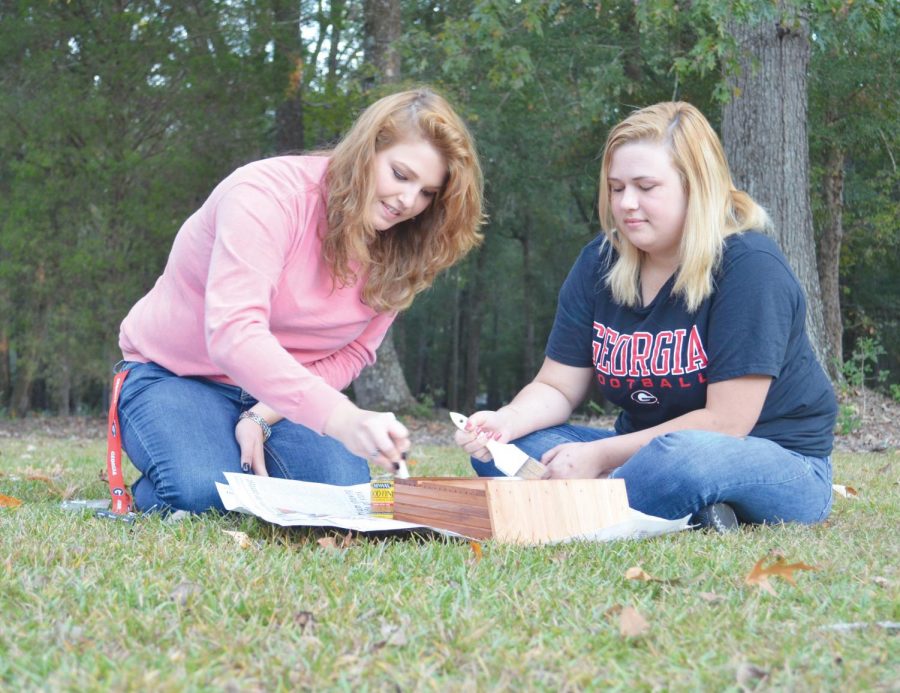Students celebrate Bat Week, protect FMU bats
Photo by: Rosaline Abuiata
The Biology Club preserves the environment by protecting bats. Bats provide ecosystem services on the FMU campus.
The FMU Biology Club hosted Bat Week from Oct. 25-30. To celebrate Bat Week, FMU biology students put up bat houses around FMU.
The Biology Club chose to install the houses to ensure the bats on campus are able to stay and take care of other organisms that could threaten human populations.
According to Dr. Paul Zwiers, assistant professor of biology and faculty advisor for the Biology Club, bats are important to the physical environment.
“Bats are crucial members of our ecosystem and maintain insect populations, including mosquitoes,” Zwiers said. “Mosquitoes carry numerous diseases, including the plasmodium parasite, which causes malaria and has been the No. 1 killer of humans worldwide.”
Zwiers said mosquitoes also carry viruses that have caused people to contract diseases.
“Mosquitoes also carry the West Nile virus,” Zwiers said. “The Department of Health and Environmental Control has confirmed 17 people have contracted West Nile in South Carolina this year.”
According to Zwiers, the diseases bats carry can be a concern.
“It is true that bats carry diseases,” Zwiers said. “But as long as you don’t catch them and cuddle with them, it’s probably okay.”
Zwiers said the diseases bats carry can be found in their excrements; however, it is not a huge concern for humans’ health.
“Some of those diseases are found in their feces, so that is a general concern,” Zwiers said. “The spreadability of that is less of a concern, particularly in relation to other species that we have on campus that also carry diseases and that can spread those diseases by close contact to humans.”
According to Zwiers, bats are already living on FMU’s campus.
“Bats are already here on campus,” Zwiers said. “They are part of the natural fauna of this region. In fact, Dr. Jeff Steinmetz in the biology department has a bat monitoring program in which students studied bat populations in the Florence area.”
According to Connor Graham, junior biology major, Bat Week is a week to acknowledge bats and how they help the environment.
“Bat Week is a time when we can celebrate all the amazing things bats do for our environment,” Graham said. “We can also raise awareness about some of the endangered species. And, they are cute.”
Graham said bats do several things to help plants and trees.
“Bats help pollinate plants and spread seeds,” Graham said. “They also eat and exterminate certain insects that destroy harvests.”
According to Zwiers, the Biology Club built the wooden houses for the bats.
“The Biology Club has specific places in mind to do this,” Zwiers said. “And one of the things they are keeping in mind is keeping them away from dense human areas.”
Zwiers said it will be more beneficial for the houses to be around water and out of reach from people who could try and play with the bats.
“We’ll be working with facilities to determine the best locations, not only from the bat’s point of view, but also from a human interaction standpoint to minimize any negative results while still increasing the benefits of having them on campus,” Zwiers said.
According to Zwiers, the bats will still be here after after Bat week is over.
“There is an ideological reason as to why they should stay for a long period of time,” Zwiers said. “By doing so, they will continue to help keep the bug population down around here.”
Zwiers said the length of the bats’ stay depends on how long the houses last.
According to Zwiers, bat week will affect our campus positively.
“Bat Week is about recognizing and supporting the role of bats in our ecosystem,” Zwiers said. “Bats play an important role in nature, not only in relation to other species, but also to humans.”
